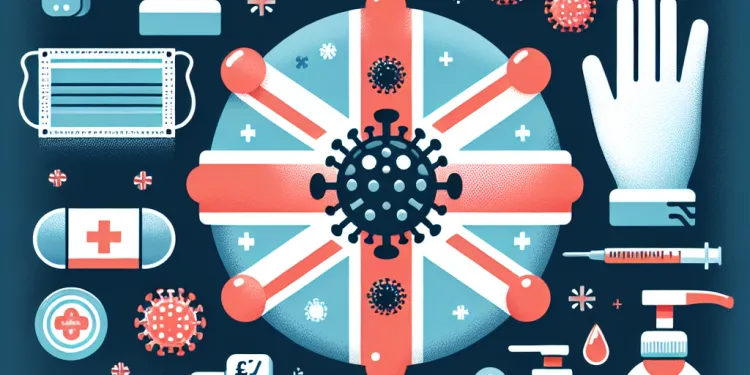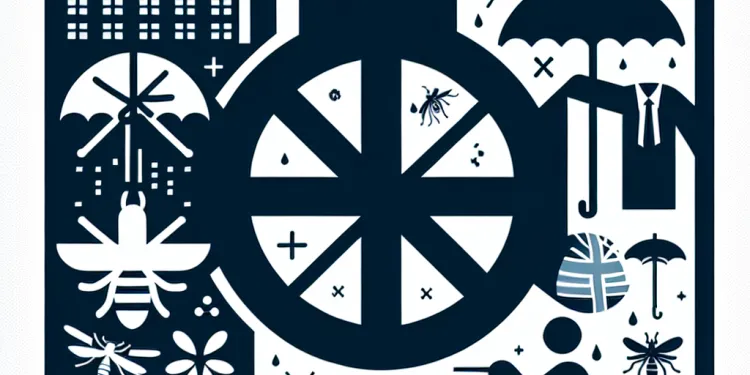
Find Help
More Items From Ergsy search
-

What preventive measures can reduce the risk of Nipah Virus infection?
Relevance: 100%
-

What are the symptoms of Nipah Virus infection?
Relevance: 69%
-

What is the mortality rate of Nipah Virus infection?
Relevance: 68%
-

What is Nipah Virus?
Relevance: 67%
-

What should someone do if they suspect Nipah Virus infection?
Relevance: 66%
-

Is there a cure for Nipah Virus?
Relevance: 64%
-

Can Nipah Virus cause outbreaks?
Relevance: 64%
-

How is Nipah Virus transmitted?
Relevance: 63%
-

What regions are most at risk for Nipah Virus outbreaks?
Relevance: 61%
-

Can Nipah Virus cause neurological complications?
Relevance: 61%
-

What role do fruit bats play in Nipah Virus transmission?
Relevance: 59%
-

How is Nipah Virus diagnosed?
Relevance: 59%
-

Can Nipah Virus be transmitted from person to person?
Relevance: 57%
-

How is Nipah Virus controlled during outbreaks?
Relevance: 57%
-

Where was Nipah Virus first identified?
Relevance: 56%
-

Which animals are known to carry Nipah Virus?
Relevance: 56%
-

Why are Nipah Virus outbreaks considered a public health concern?
Relevance: 53%
-

What global organizations are involved in Nipah Virus research?
Relevance: 51%
-

Has a vaccine been developed against Nipah Virus?
Relevance: 51%
-

What is Chikungunya virus infection?
Relevance: 43%
-

What measures are being taken to control Marburg virus outbreaks?
Relevance: 42%
-

Can Marburg virus disease be prevented?
Relevance: 42%
-

Can Chikungunya virus infection be treated?
Relevance: 41%
-

Can men in the UK transmit Zika virus if infected?
Relevance: 40%
-

What are some preventive measures against H3N2?
Relevance: 39%
-

Who is at risk for severe Chikungunya infection?
Relevance: 38%
-

Who is at risk for severe illness from West Nile Virus?
Relevance: 36%
-

How can healthcare workers protect themselves from Marburg virus infection?
Relevance: 36%
-

How is Chikungunya virus infection diagnosed?
Relevance: 36%
-

How can Chikungunya virus be prevented?
Relevance: 35%
-

How can I prevent norovirus infection?
Relevance: 35%
-

Are there any countries at higher risk for Marburg virus outbreaks?
Relevance: 34%
-

Are there any preventative measures for flesh-eating disease?
Relevance: 34%
-

Can air physiotherapy prevent respiratory infections?
Relevance: 33%
-

How is West Nile Virus transmitted?
Relevance: 33%
-

What is the Marburg Virus?
Relevance: 32%
-

What measures are taken to prevent disease transmission in blood transfusions?
Relevance: 32%
-

How is the Marburg virus transmitted?
Relevance: 32%
-

How is Chikungunya virus transmitted?
Relevance: 32%
-

How can E. coli infections be prevented?
Relevance: 31%
Understanding the Nipah Virus
The Nipah virus is a zoonotic virus, meaning it can be transmitted from animals to humans. It can also be transmitted through contaminated food or directly between people. The virus was first identified during an outbreak in Malaysia in 1998, and outbreaks generally occur in South and Southeast Asia. While there have been no reported cases in the UK, understanding how to prevent infection remains vital.
Preventive Measures to Reduce Infection Risk
Implementing effective preventive measures can significantly reduce the risk of Nipah virus infection. Here are some key strategies:
Avoiding Contact with Bats and Their Habitats
Bats are the primary natural hosts of the Nipah virus. Avoiding direct contact with bats and their droppings is crucial. It is advisable to stay away from areas known for bat populations, especially in regions where outbreaks have occurred. Avoiding contact with sick animals, particularly pigs, can also help prevent transmission.
Safe Consumption of Food Products
The Nipah virus can be spread through food products contaminated with urine or saliva from infected bats. To minimize risk, refrain from consuming raw date palm sap, which bats may contaminate. Ensuring all fruits and vegetables are properly washed and peeled before consumption is also recommended. Pasteurizing or boiling food products can kill the virus, making them safe to eat.
Maintaining Proper Hygiene Practices
Good hygiene practices are essential in preventing the spread of the Nipah virus. Regularly washing hands with soap and water, especially after handling animals or their products, can reduce the risk. Healthcare workers should follow strict infection control protocols, such as using personal protective equipment (PPE) when treating patients suspected of having the Nipah virus.
Community Awareness and Education
Raising awareness about the Nipah virus and its transmission is vital, especially in at-risk regions. Community education programs should focus on teaching individuals how the virus is spread and the importance of early detection and reporting of symptoms. Informed communities are more likely to adopt preventive measures effectively.
Travel Advisories and Caution
For those traveling to regions affected by the Nipah virus, it is important to stay informed about current outbreaks and follow travel advisories. Avoid visiting farms or areas where the virus is known to be prevalent, and adopt preventive practices as recommended by health authorities.
By following these preventive measures, the risk of Nipah virus infection can be substantially reduced. Ongoing research and monitoring are essential to further understand the virus and develop more effective strategies to combat its spread.
Understanding the Nipah Virus
The Nipah virus is a germ that can make people sick. This germ can spread from animals to people. It can also spread by eating bad food or from one person to another. The Nipah virus was first found in Malaysia in 1998. It mostly happens in South and Southeast Asia. There have been no Nipah virus cases in the UK, but it is important to know how to stay safe from it.
Ways to Stay Safe from the Virus
Here are some ways you can protect yourself from the Nipah virus:
Stay Away from Bats and Their Homes
Bats carry the Nipah virus. Do not touch bats or their droppings. Stay away from places where there are lots of bats, especially in areas where Nipah virus has been found. Do not touch sick animals like pigs too.
Be Careful with Food
The Nipah virus can get on food if bats pee or spit on it. Do not drink raw date palm sap because bats might have touched it. Wash and peel fruits and vegetables before you eat them. Cooking or boiling food can kill the virus, so it is safe to eat.
Keep Clean and Wash Hands
Washing hands with soap and water is very important to stay safe from the Nipah virus. Always wash your hands after touching animals or their droppings. People who take care of sick people need to wear special gowns, masks, and gloves to protect themselves.
Teach and Learn About the Virus
Teaching people about the Nipah virus and how it spreads is important, especially where the virus might be. Learning about it helps people know how to protect themselves. If a lot of people know about the virus, they can stop it from spreading.
Travel Tips and Being Careful
If you are traveling to places where the Nipah virus is, you should learn about any outbreaks there. Follow travel tips and stay away from farms or places where the virus is found. Use safe practices while traveling, as health experts advise.
By following these steps, you can keep yourself safe from the Nipah virus. Scientists are working to learn more about the virus and find better ways to fight it.
Frequently Asked Questions
What is the Nipah virus?
Nipah virus is a zoonotic virus, meaning it is transmitted from animals to humans, and can cause severe illness in both animals and humans.
How is Nipah virus transmitted?
Nipah virus is transmitted through direct contact with infected bats, pigs, or from human-to-human through bodily fluids.
What preventive measures can be taken to reduce the risk of Nipah virus?
Preventive measures include avoiding contact with infected animals, practicing good hygiene, and avoiding consumption of raw date palm sap.
How can avoiding raw date palm sap help prevent Nipah virus infection?
Bats can contaminate date palm sap, which can then transfer the Nipah virus. Avoiding its consumption reduces risk.
Can practicing good hygiene reduce Nipah virus risk?
Yes, regular handwashing and practicing good hygiene can minimize the spread of the virus.
Why is it important to avoid contact with bats?
Bats are natural reservoirs for Nipah virus, and direct contact can lead to transmission to humans.
What role do health authorities play in preventing Nipah virus outbreaks?
Health authorities can monitor outbreaks, disseminate information, and implement quarantines to prevent spread.
Can vaccines help prevent Nipah virus?
Currently, there is no licensed vaccine for Nipah virus, so prevention focuses on avoiding exposure.
What should one do if they suspect exposure to the Nipah virus?
Seek medical attention immediately and follow local health guidelines to prevent further spread.
Why is it important to monitor health after visiting affected areas?
Monitoring health allows for early detection and treatment of symptoms if infection occurs.
How does avoiding contact with sick animals prevent Nipah virus?
Many animals, especially infected pigs, can spread the virus to humans; avoiding contact reduces risk.
Can quarantine measures help control Nipah virus outbreaks?
Yes, quarantining infected individuals can prevent the spread to others and control the outbreak.
Is it safe to consume fruits from areas affected by Nipah virus?
It is risky as fruits may be contaminated by bats; avoid fruits that may have been exposed.
How can educating communities reduce Nipah virus risk?
Education increases awareness and promotes safe practices that can reduce transmission risk.
What personal protective equipment (PPE) is recommended to prevent Nipah virus?
Healthcare workers should use gloves, masks, and gowns to protect themselves when treating patients.
Can cooking foods thoroughly help prevent Nipah virus infection?
Yes, thoroughly cooking foods, especially animal products, can kill viruses and other pathogens.
Why is avoiding human-to-human contact important in Nipah virus prevention?
Nipah virus can spread through bodily fluids between humans; avoiding contact can minimize spread.
What role do bats play in the Nipah virus life cycle?
Bats are natural hosts for the virus and can spread it to other animals and humans.
How can communities manage the risk of Nipah virus from wildlife?
Managing risk involves habitat conservation, regulating animal-human interaction, and public awareness.
What are the symptoms of Nipah virus infection?
Symptoms include fever, headache, dizziness, drowsiness, and respiratory issues, which can progress to encephalitis.
What is Nipah virus?
Nipah virus is a germ that can make people and animals very sick. It can move from animals to people.
How does the Nipah virus spread?
The Nipah virus is a germ that can make people sick.
Here is how it spreads:
- It can spread from bats to people. Bats may carry the virus.
- People can get it by touching pigs or eating food with the virus.
- It can also spread from person to person through close contact.
To stay safe, wash your hands often. Use hand sanitizer if you do not have soap and water. Avoid touching sick animals. Cook food well before eating.
Nipah virus can spread in a few ways. You can catch it if you touch sick bats, sick pigs, or if you touch someone's body fluids, like blood, who is sick with it.
How can we stop people from getting the Nipah virus?
We can take steps to keep people safe from the Nipah virus. Here are some ways to help:
- Wash your hands often with soap and water.
- Stay away from bats and their droppings.
- Don't eat fruits that bats might have pecked.
- Boil water before drinking if it is from a well. Bats might have been near the well.
- Avoid contact with sick people who have a fever, cough, or other symptoms.
- Talk to a doctor about vaccines or medicines if available.
Using pictures or videos can help you learn more about how to stay safe. You can also ask someone for help or use tools that read words out loud to you.
To stay safe, do not touch animals that are sick. Always wash your hands well and do not drink juice from date palm trees if it has not been cooked.
How can not drinking raw date palm sap stop Nipah virus infection?
Don't drink raw date palm sap. It can have the Nipah virus.
What you can do:
- Boil date palm sap before drinking.
- Ask an adult for help to check if it's safe.
Bats can make date palm sap unsafe because they can spread the Nipah virus. It's a good idea to not drink this sap to stay safe.
Can staying clean help stop Nipah virus?
Staying clean can help protect you from getting sick. Washing hands, keeping surfaces clean, and covering your mouth when you cough can stop germs. These actions can help keep the Nipah virus away.
Here are some tips and tools to help:
- Use soap and water to wash your hands.
- Use disinfectant wipes to clean surfaces.
- Download apps that remind you to wash your hands.
Washing your hands often and staying clean can help stop the virus from spreading.
Why should we stay away from bats?
Bats might carry germs that can make us sick. It's safer to watch them from far away.
If you see a bat, tell an adult. They can help. If a bat is inside, get an adult to call someone to take it out safely.
Use videos or books for learning more about bats. They can help us learn without getting close to real bats.
Bats can carry Nipah virus. People can catch it if they touch bats.
How do health authorities help stop Nipah virus outbreaks?
Health authorities work to keep people safe from the Nipah virus. They do this by finding out where the virus is and stopping it from spreading. They also teach people how to protect themselves.
To help understand and learn, you can use pictures or watch videos. These tools can make it easier to see how the Nipah virus spreads and how to stay safe.
Doctors and nurses watch for the spread of illness. They tell people what to do to stay safe and sometimes ask people to stay at home if they are sick to stop it from spreading.
Do vaccines stop the Nipah virus?
Right now, there is no vaccine for the Nipah virus. This means there's no medicine you can get to stop you from catching it. To stay safe, try to stay away from things that might give you the virus.
What should you do if you think you have been near Nipah virus?
See a doctor or nurse right away. Listen to safety rules to stop it from spreading.
Why should you check your health after going to places with sickness?
After you go to a place where people are sick, it is good to pay attention to how you feel. This helps you know if you got sick too.
Here are some helpful tips:
- Ask someone you trust for help if you need it.
- Use a calendar to mark the days you feel unwell.
- If you feel sick, tell a doctor or grown-up.
Checking your health helps find problems early so you can get better faster.
How can staying away from sick animals stop the Nipah virus?
Keep away from animals that look sick. This helps stop you from catching the Nipah virus.
Here are some things you can do:
- Stay away from animals that are not healthy.
- Do not touch animals that look sick.
- Wash your hands after touching animals.
Lots of animals, like sick pigs, can give the virus to people. To stay safe, try not to touch them.
Can staying away from others help stop the Nipah virus from spreading?
When people are sick with the Nipah virus, staying home helps keep others from getting sick too. This is called quarantine.
Quarantine means a person who is sick stays away from other people.
If everyone who is sick stays home, the virus cannot spread as easily.
Helpful Tip: If you feel sick, tell a grown-up or see a doctor. They can help you know what to do.
Yes, keeping sick people away from others can stop the sickness from spreading and help keep everyone safe.
Can you eat fruits from places with Nipah virus?
If you want to eat fruit from places with the Nipah virus, be careful. Here are some tips:
- Wash fruits well with clean water.
- Peel the skin off the fruit before eating.
- Look for signs of animal bites or damage on the fruit.
If you are unsure, ask a grown-up or a doctor.
Eating some fruits can be dangerous because bats might touch them. Do not eat fruits that bats might have been near.
How can teaching people help lower Nipah virus risk?
We can make the Nipah virus less risky by teaching everyone in the community. Here is how:
- Tell people what the Nipah virus is and how it spreads.
- Show ways to keep clean and safe, like washing hands often.
- Explain the importance of staying away from bats and sick animals.
- Encourage people to go to the doctor if they feel sick.
To help understand, use pictures or videos. Try repeating important points often. You can also use simple apps or tools that talk or show pictures to explain ideas.
Education helps people know more and make good choices. This can keep them safe and stop the spread of germs.
What safety gear should you wear to prevent Nipah virus?
To stay safe from the Nipah virus, it's important to wear special safety gear. This gear includes:
- Gloves: Wear gloves to keep your hands safe.
- Masks: Use a mask to cover your nose and mouth.
- Face shields or goggles: Protect your eyes with a face shield or goggles.
- Gowns or coveralls: Wear a gown or coveralls to cover your body.
- Boots: Put on boots to protect your feet.
Ask an adult or teacher if you need help or have questions about how to use this gear. They can show you how to wear it the right way.
Doctors and nurses should wear gloves, masks, and gowns when helping sick people. This keeps them safe.
Can cooking food well stop Nipah virus infection?
Yes, cooking food well can kill germs and viruses. This is very important for meat and eggs.
Why is it important to stay away from people to stop spreading Nipah virus?
It's good to stay away from others if there is a Nipah virus outbreak. This helps stop the virus from spreading.
Here are some things you can do:
- Don't shake hands or hug people.
- Try not to be in crowded places.
- If you feel sick, tell a grown-up and stay home.
Nipah virus can spread from one person to another through body fluids like spit or pee. To stay safe, try not to touch these fluids.
How do bats help spread the Nipah virus?
Bats can carry a virus. They can give this virus to other animals and people.
How can people keep safe from Nipah virus from wild animals?
Looking after animals and nature means keeping their homes safe, being careful when people and animals meet, and teaching people about nature.
What happens if you get the Nipah virus?
If someone has the Nipah virus, they might:
- Feel very tired.
- Have a high fever (feel very hot).
- Have a headache.
- Feel dizzy or confused.
- Have a cough.
- Feel sick and want to throw up.
- Have a hard time breathing.
Sometimes, it can make people very sick. They might need to see a doctor or go to the hospital.
If you want to know more or need help, try using picture lists or asking someone you trust to explain. Talking to a doctor can also help you understand more.
Signs you are sick can be:
- Feeling very hot (fever)
- Head hurts (headache)
- Feeling dizzy, like things are spinning (dizziness)
- Feeling very sleepy (drowsiness)
- Breathing problems
If you feel like this, you might need to see a doctor.
Useful Links
This website offers general information and is not a substitute for professional advice.
Always seek guidance from qualified professionals.
If you have any medical concerns or need urgent help, contact a healthcare professional or emergency services immediately.
Some of this content was generated with AI assistance. We’ve done our best to keep it accurate, helpful, and human-friendly.
- Ergsy carfully checks the information in the videos we provide here.
- Videos shown by Youtube after a video has completed, have NOT been reviewed by ERGSY.
- To view, click the arrow in centre of video.
- Most of the videos you find here will have subtitles and/or closed captions available.
- You may need to turn these on, and choose your preferred language.
- Go to the video you'd like to watch.
- If closed captions (CC) are available, settings will be visible on the bottom right of the video player.
- To turn on Captions, click settings .
- To turn off Captions, click settings again.
More Items From Ergsy search
-

What preventive measures can reduce the risk of Nipah Virus infection?
Relevance: 100%
-

What are the symptoms of Nipah Virus infection?
Relevance: 69%
-

What is the mortality rate of Nipah Virus infection?
Relevance: 68%
-

What is Nipah Virus?
Relevance: 67%
-

What should someone do if they suspect Nipah Virus infection?
Relevance: 66%
-

Is there a cure for Nipah Virus?
Relevance: 64%
-

Can Nipah Virus cause outbreaks?
Relevance: 64%
-

How is Nipah Virus transmitted?
Relevance: 63%
-

What regions are most at risk for Nipah Virus outbreaks?
Relevance: 61%
-

Can Nipah Virus cause neurological complications?
Relevance: 61%
-

What role do fruit bats play in Nipah Virus transmission?
Relevance: 59%
-

How is Nipah Virus diagnosed?
Relevance: 59%
-

Can Nipah Virus be transmitted from person to person?
Relevance: 57%
-

How is Nipah Virus controlled during outbreaks?
Relevance: 57%
-

Where was Nipah Virus first identified?
Relevance: 56%
-

Which animals are known to carry Nipah Virus?
Relevance: 56%
-

Why are Nipah Virus outbreaks considered a public health concern?
Relevance: 53%
-

What global organizations are involved in Nipah Virus research?
Relevance: 51%
-

Has a vaccine been developed against Nipah Virus?
Relevance: 51%
-

What is Chikungunya virus infection?
Relevance: 43%
-

What measures are being taken to control Marburg virus outbreaks?
Relevance: 42%
-

Can Marburg virus disease be prevented?
Relevance: 42%
-

Can Chikungunya virus infection be treated?
Relevance: 41%
-

Can men in the UK transmit Zika virus if infected?
Relevance: 40%
-

What are some preventive measures against H3N2?
Relevance: 39%
-

Who is at risk for severe Chikungunya infection?
Relevance: 38%
-

Who is at risk for severe illness from West Nile Virus?
Relevance: 36%
-

How can healthcare workers protect themselves from Marburg virus infection?
Relevance: 36%
-

How is Chikungunya virus infection diagnosed?
Relevance: 36%
-

How can Chikungunya virus be prevented?
Relevance: 35%
-

How can I prevent norovirus infection?
Relevance: 35%
-

Are there any countries at higher risk for Marburg virus outbreaks?
Relevance: 34%
-

Are there any preventative measures for flesh-eating disease?
Relevance: 34%
-

Can air physiotherapy prevent respiratory infections?
Relevance: 33%
-

How is West Nile Virus transmitted?
Relevance: 33%
-

What is the Marburg Virus?
Relevance: 32%
-

What measures are taken to prevent disease transmission in blood transfusions?
Relevance: 32%
-

How is the Marburg virus transmitted?
Relevance: 32%
-

How is Chikungunya virus transmitted?
Relevance: 32%
-

How can E. coli infections be prevented?
Relevance: 31%


